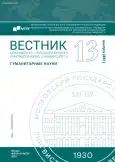Functions of Discourse Markers in Oral Dialogical Speech (based on French street interviews)
- Autores: Zueva E.S.1
-
Afiliações:
- Moscow State Linguistic University
- Edição: Nº 13(881) (2023)
- Páginas: 30-36
- Seção: Linguistics
- URL: https://journal-vniispk.ru/2542-2197/article/view/320192
- ID: 320192
Citar
Texto integral
Resumo
This article examines the functions of discourse markers, their role in providing for effective interaction. In the article some specific examples of the use of discourse markers by French natives are given in order to determine and illustrate their main and secondary functions. The objective of the artcile is to reveal the status, the role and the pragmatic potential of discourse markers which constitute very special language units that appeared as a result of pragmaticalisation and that perform a range of highly important functions.
Sobre autores
Elena Zueva
Moscow State Linguistic University
Autor responsável pela correspondência
Email: lenok.zs98@gmail.com
Post-graduate Student Department of Lexicology and Stylistics of the French Language Faculty of the French Language Moscow State Linguistic University
RússiaBibliografia
- Zajdes, K. D. (2020). Pragmaticheskie markery` predikativnogo tipa v russkoj ustnoj spontannoj rechi = Predicative pragmatic markers in Russian oral spontaneous speech: PhD in Phylology. St. Petersburg. (In Russ.)
- Bogdanova-Beglaryan, N. V. (2014). Pragmatic items in everyday speech: definition of the concept and general typology // Perm University Herald. Russian and Foreign Philology, 3(27), 7–20. (In Russ.)
- Shustova, S. V., Tsarenko, N. M. (2018). Discursive markers as a means of forming pragmatic linguistic competence. Research results. Theoretical and Applied Linguistics, 4(2), 21–29. (In Russ.)
- Ivanov, V. D. (2020). Funkczii diskursivny`kh chasticz v nemeczkom yazy`ke yazy`ke = Functions of discursive particles in German: PhD in Phylology. My`tishhi. (In Russ.)
- Kasaeva, Z. V. (2014). On the main aspects of studying of the spontaneous speech (generalcomments). Bulletin MRSU. Russian Studies in Philology, 2, 60–68. (In Russ.)
- Deng, D. (2016). Oui, voilà: analyse des deux marqueurs discursifs utilisés par les locuteurs du français d’origine chinoise en France. Cahiers AFLS eJournal, 20(1), 45–69.
- Beeching, K. (2007). La co-variation des marqueurs discursifs bon, c’est-à-dire, enfin, hein, quand même, quoi et si vous voulez : Une question d’identité ? Langue française, 154(2), 78–93.
- Deng, D. (2018). « Comme c’est un peu langage des jeunes quoi » : analyse du marqueur discursif quoi dans le discours des Chinois résidant en France. SHS Web Conf, 46. https://www.shs-conferences.org/articles/shsconf/abs/2018/07/shsconf_cmlf2018_13001/shsconf_cmlf2018_13001.html
- Stenkløv, N. F. (2015). Du coup : Un connecteur plus ou moins « logique » de l’argumentation orale. Synergies Pays Scandinaves, 10, 11–22.
- Haßler, G. (2016). Pragmaticalisation parallèle des marqueurs discursifs : le cas de déjà. CMLF.
- Morency, P. (2009). Déjà : un marqueur procédural de subjectivisation. Tranel, 51, 19–43.
- Beeching, K. (2002). Gender, politeness and pragmatic particles in French. Amsterdam & Philadelphia: John Benjamins. Pragmatics & Beyond New Series.
- Kudryavceva, N. B. (2018). Yavlenie pragmatikalizacii vo frankoyazychnom dialogicheskom diskurse (na primere prilagatel’nogo petit) = The phenomenon of pragmaticalisation in French dialogical discourse (on the example of the adjective petit). E`volyuciya romanskix yazy`kov: ot yazy`ka narodnosti k yazy`ku nacii (pp. 197–202): Proceedings of the International Scientific Conference. (In Russ.)
- Nikishina, E. A. (2022). Discursive Markers-Regulators of Communication (po)slušaj, (po)smotri, (po)stoj and Their Usage Characteristics. Russian Speech, 5, 47–63. (In Russ.)
- Lefeuvre, F., Legallois, D. (2020). Les marqueurs discursifs rédupliqués : le cas de oui oui oui oui. Représentations du sens linguistique : modalité intra- et extra-phrastique (pp. 181–198).
Arquivos suplementares










